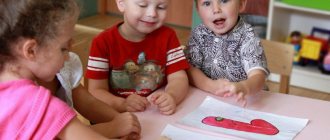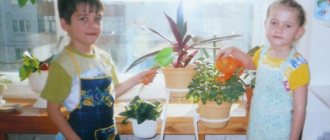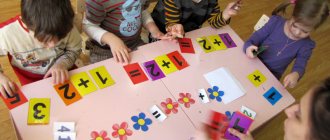Self-education plan on the topic “Formation of the concept of number in preschoolers”
Education Committee of Ulan-Ude
Municipal autonomous preschool educational institution
Kindergarten No. 59 “Golden Key”
Self-education plan
on the topic “Formation of the concept of number in preschoolers” for the 2020-2021 academic year.
Vasilyeva A.A.
Ulan-Ude
2020
Self-education plan for a preschool teacher on the topic: “Formation of the concept of number in preschoolers.”
Subject:
Formation of the concept of number in preschoolers.
Target:
increasing your theoretical level, professional skills and competence on this topic.
Tasks:
1. Develop a child’s interest in mathematics in preschool age.
2. Study psychological and pedagogical literature on this topic of self-education, study pedagogical experience through articles in the media, the Internet.
3. Introduction to the subject in a playful and entertaining way.
4. Develop and implement educational and educational programs using ICT into the practice of educational activities.
5. Develop methodological recommendations and didactic materials.
6. Enrich with new ideas and concepts; consolidate knowledge; activate mental activity (ability to compare, generalize, classify, analyze).
Relevance of the chosen topic.
"Mathematics brings order to the mind."
M. V. Lomonosov.
The mental education of a child is the most important pedagogical task at all age stages of a preschooler’s development. One of the main tasks of mental education is to familiarize children with the factors and phenomena of the surrounding world. When getting to know them, children’s ideas are enriched, curiosity and educational interests are stimulated.
For the mental development of preschool children, their acquisition of mathematical concepts, which actively influence the formation of mental abilities so necessary for understanding the world around them, is essential.
Modern psychological and pedagogical science has indisputably proven that mastering a system of mathematical knowledge has a significant impact on the mental and psychological development of a preschooler; determined that for preschool children, mastering basic mathematical knowledge has cognitive, educational significance, and is also one of the conditions for a child’s readiness for school. Mathematical concepts serve as a means of a child’s intellectual development, his cognitive and creative abilities. The success of teaching mathematics in primary school depends on the effectiveness of a child’s mathematical development in preschool age.
It should be remembered that in order to teach preschool children to love mathematics, maintain their interest in intellectual activity, and encourage them to solve search problems, it is necessary to approach the organization of the learning process creatively and with interest, to use the variety and variability of educational games with mathematical content.
The resolution of these disputes is carried out in the search for new ways, methods and forms of organizing the process of raising children in preschool institutions, as well as using the potential of educational games and author's manuals in working with children in FEMP.
Preschool age is the beginning of a long road into the world of miracles, knowledge and discoveries. It is at this time that children lay the foundation for further learning. And the main task of adults is to teach them not only to read and count, how to hold a pen and pencil correctly, but, above all, to think. When going into the fascinating world of mathematics, it is important that the child does not cram mathematical concepts, but gets acquainted with material that will provide him with the opportunity to create, think, and affect not only the intellectual, but also the emotional sphere. We, teachers, must give the child not only specific concepts, but also an understanding of general patterns, and most importantly, a feeling of joy when overcoming difficulties.
Mathematics accompanies us throughout our lives. It is impossible for a person to live without counting, without the ability to correctly add, subtract, multiply and divide numbers. Therefore, the sooner a child understands and masters the basics of mathematics, the easier it will be for him in the future.
It is known that mathematics is a huge factor in the intellectual development of a child and the formation of his cognitive and creative abilities. It promotes the development of memory, speech, imagination, emotions, forms perseverance, patience, creative potential of the individual, as well as methods of mental activity.
Many modern parents believe that if a child can read and count, then he is ready for school, but this is a misconception. In order for a preschooler to correspond to the social role of a student, he must have such qualities as the ability to listen and hear, work in a team and independently, he must have the desire and habit of thinking, and the desire to learn something new.
The modern world around a child is constantly changing and dynamic. The education system should help ensure that the child receives such knowledge, skills and abilities that would allow him to successfully adapt to new conditions of society.
Today there are a large number of educational programs for kindergarten, and institutions have the opportunity to choose the one that meets their requirements and interests.
Modern requirements, taking into account the federal state educational standard of preschool education for developmental education during preschool childhood, dictate the need to create new forms of play activity that would preserve elements of cognitive, educational and playful communication. The formation and development of mathematical concepts in preschoolers is the basis for the intellectual development of children and contributes to the general mental education of the preschooler. Intellectual development is the development of operational structures of the intellect, during which mental operations gradually acquire qualitatively new properties: coordination, reversibility, automation.
Long-term work plan for self-education for the 2022-2021 academic year.
| Chapter | Deadlines | The content of the work | Practical solutions |
| Studying literature. | September – May | 1. Ponomareva I. A., Pozina V. A. Formation of elementary mathematical representations. Senior group. Ed. Mosaic-Synthesis. M.: 2016. 2. Developmental activities for children aged 5-7 years. / ed. L. A. Paramonova. – M., 2009. 3. Kovalenko V.G. Didactic games in mathematics lessons. - M., 2000. 4.A. Beloshistaya “Preschool age: the formation and development of mathematical abilities.” Preschool education-2000-No. 2, p. 74. 5. Vavilov, Yu. P. Games for the attentive and smart. – Yaroslavl 2000. – p. 122. 6. Wenger L. A. Games and exercises for the development of mental abilities in preschool children. M: Enlightenment 1989. | 1.Development of GCD notes. 2. Development of individual tasks for preschoolers. |
| Work with children | September | Didactic game “How much?”, “Which number is missing?” | Card index of didactic games. |
| October | Didactic game “Confusion?”, “What has changed.” | Thematic role-playing game “Walk in the Forest”. | |
| November | Game “Wonderful bag”, “Numbers - inserts” | Evening of outdoor games with mathematical content “The mice came out one day”, “Cosmonauts”. | |
| December | Didactic game “Count without mistakes”, “Insert the missing numbers”. | Theatrical game “Kolobok is looking for friends.” | |
| January | Didactic game “The numbers got lost”, “Housewarming”. | Open event “Parade of Numbers”. | |
| February | Didactic game “Who will be the first to name?”, “Who will be the first to name the toy that is gone?” | Math Walk | |
| March | Didactic game “Count - don’t be mistaken!” ", domino "Fun exercise" | Mathematical quiz "Guess it." | |
| April | Didactic game “Fun Counting”, “Logic Train”. | Thematic role-playing game “Shop”. | |
| May | The plot-role-playing game “Ticket to the Cinema”, the didactic game “Whose House?” | Open event “The Adventures of Dunno”. | |
| September – May | Reading fiction to children: A. Barto “Arithmetic”, V. Kudryavtseva “In the Fish Kingdom”, G. Dyadina “Fun Steps”, A. Goltseva “Funny Numbers”, O. Emelyanova “Problems in Poems for Kids”, V. Stepanova “Tick-counting”, Yu. Yakovlev “Let’s, guys, learn to count.” | ||
| Working with parents | September | Consultation “Development of children’s ideas and concepts about number and counting.” | Card index of didactic games. |
| January | Preparing a card index of games for older children. | Exhibition design: “Mathematical games and exercises for preschoolers.” | |
| May | Consultation “Fun puzzles in poetry for preschoolers.” | “Mathematics with your own hands” (exhibition of didactic games, attributes). | |
| Self-realization | During the year | Generalization of experience in the form of consultation | “Methodology for the formation of quantitative ideas in the middle group.” |
| May | Report on the topic of self-education. | ||
Long-term self-education plan for the 2022 academic year.
| Chapter | Deadlines | The content of the work | Practical solutions | |
| Studying literature. | September – May | 1. Leushina A. M. “Mathematics classes in kindergarten,” M.: 2005. 2. Metlina A. S. “Mathematics in kindergarten” Education, 2006. 3. Smolentseva, A. A. Plot-didactic games. - M.: Education, 1987. - 96 p. 4. Sorokina A.I. Didactic game in kindergarten. - M.: Education, 1982. - 98 p. 5. Stolyar A. A. “Formation of elementary mathematical concepts in preschoolers,” – M.: 2006. 6. Joiner A. A. Let's play / M. Enlightenment, 1996. 7.A. Beloshistaya “Preschool age: the formation and development of mathematical abilities.” Preschool education-2000-No. 2, p. 74. 8. Ponomareva I. A., Pozina V. A. Formation of elementary mathematical representations. Junior group. Ed. Mosaic-Synthesis. M.: 2016. | 1.Development of GCD notes. 2. Development of individual tasks for preschoolers. | |
| Work with children | September | Didactic game “How much?”, “Treat the hares with carrots.” | Card index of didactic games. | |
| October | Didactic game “Take the same amount”, “Remove the excess”. | Thematic role-playing game “Shop”. | ||
| November | Game “Wonderful bag”, “Knock the same number of times”. | An evening of outdoor games with mathematical content: “The mice came out one day,” “Find your house.” | ||
| December | Didactic game “How much?”, “Make it equally.” | Theatrical game "Teremok". | ||
| January | Didactic game “Find out if it’s equal?”, “Remove the excess.” | Open event "". | ||
| February | Didactic game “Treat the dolls with candy”, “Arrange in pairs”. | |||
| March | Didactic game “Let’s decorate the scarf”, dominoes “One - many” | |||
| April | Didactic game “What is more - what is less”, “Place in order”. | Thematic role-playing game “Shop”. | ||
| May | Plot-role-playing game "Vari's Birthday", didactic game "" | Open event “Teach Bunny Math.” | ||
| September – May | Reading fiction to children: A. Barto “Arithmetic”, V. Kudryavtseva “In the Fish Kingdom”, G. Dyadina “Fun Steps”, A. Goltseva “Funny Numbers”, O. Emelyanova “Problems in Poems for Kids”, V. Stepanova “Tick-counting”, Yu. Yakovlev “Let’s, guys, learn to count.” | |||
| Working with parents | September | Consultation “Development of children’s ideas and concepts about number and counting.” | Card index of didactic games. | |
| January | Create a folder for moving “Entertaining mathematics at home in everyday life.” | Exhibition design: “Mathematical games and exercises for preschoolers.” | ||
| May | Consultation “Methodology for forming quantitative ideas in the junior group.” | “Mathematics with your own hands” (exhibition of didactic games, attributes). | ||
| Self-realization | January | Speech at the teachers' meeting. | “Methodology for the formation of quantitative ideas in the younger group.” | |
| May | Report on the topic of self-education. Open event screening. | Speech at the teachers' meeting. Open event “Lessons from Aunt Owl”. | ||
| September – May | mini-site on the portal nsportal.ru for sharing experiences with other regions. | Participation in competitions. | ||
Long-term self-education plan for the 2022 academic year.
| Chapter | Deadlines | The content of the work | Practical solutions | |
| Studying literature. | September – May | 1. Ponomareva I. A., Pozina V. A. Formation of elementary mathematical representations. Preparatory group. Ed. Mosaic-Synthesis. M.: 2016. 2. Developmental activities for children aged 5-7 years. / ed. L. A. Paramonova. – M., 2009. 3. Kovalenko V.G. Didactic games in mathematics lessons. - M., 2000. 4.A. Beloshistaya “Preschool age: the formation and development of mathematical abilities.” Preschool education-2000-No. 2, p. 74. 5. Vavilov, Yu. P. Games for the attentive and smart. – Yaroslavl 2000. – p. 122. 6. Wenger L. A. Games and exercises for the development of mental abilities in preschool children. M: Enlightenment 1989. | 1.Development of GCD notes. 2. Development of individual tasks for preschoolers. | |
| Work with children | September | Didactic game “How much?”, “Which number is missing?” | Card index of didactic games. | |
| October | Didactic game “Confusion?”, “Make up a number.” | Mathematical fairy tale "The Adventures of a Kolobok". | ||
| November | Game “Magpie - Postman”, “Numbers - Inserts” | Evening of outdoor games with mathematical content “Take your seat”, “Funny Bus”. | ||
| December | Didactic game “Find a pair”, “Insert the missing numbers”. | Theatrical game "Teremok". | ||
| January | Didactic game “Numbers Got Lost”, “Living Numbers”. | Open event "Labyrinth". | ||
| February | Didactic game “Number, what is your name?”, “Who will be the first to name the toy that is gone?” | Replenishment of the mathematics corner. | ||
| March | Didactic game “Number ladder”, dominoes “Fun exercise” | Mathematical quiz "Guess it." | ||
| April | Didactic game "Fun Counting" | Thematic role-playing game “Shop”. | ||
| May | The plot-role-playing game “Ticket to the Cinema”, the didactic game “Find one less”. | Open event "Magic Box". | ||
| September – May | Reading fiction to children: S.Ya. Marshak “Fun Counting”, A. Goltseva “Funny Numbers”, M. Shvarts “Fun Counting from 0 to 10”, N. Vladimirova “Count Down”, V. Oseeva “Five Sons”, A. Usachev “Seven Forty”, etc. .P. | |||
| Working with parents | September | Consultation “Development of mathematical abilities in preschoolers 6-7 years old.” | Card index of didactic games. | |
| January | Consultation “Stages of acquaintance of preschoolers with two-digit numbers.” | “Mathematics with your own hands” (exhibition of didactic games, attributes). | ||
| May | Create a folder for moving “Arithmetic riddles for preschoolers.” | Exhibition design: “Mathematical games and exercises for preschoolers.” | ||
| Self-realization | January | Open event screening. Speech at the teachers' meeting. | Open event “The duck had ten chickens.” “Methodology for the formation of quantitative ideas in a preparatory group for school.” | |
| May | Report on the topic of self-education. Open event screening. | Speech at the teachers' meeting. Open event "Magic Box". | ||
| September – May | mini-site on the portal nsportal.ru for sharing experiences with other regions. | Participation in competitions. | ||
Long-term self-education plan for the 2022 academic year.
| Chapter | Deadlines | The content of the work | Practical solutions | |
| Studying literature. | September – May | 1. Developmental activities for children aged 5-7 years. / ed. L. A. Paramonova. – M., 2009. 2. Kovalenko V.G. Didactic games in mathematics lessons. - M., 2000. 3.A. Beloshistaya “Preschool age: the formation and development of mathematical abilities.” Preschool education-2000-No. 2, p. 74. 4. Vavilov, Yu. P. Games for the attentive and smart. – Yaroslavl 2000. – p. 122. 5. Wenger L. A. Games and exercises for the development of mental abilities in preschool children. M: enlightenment 1989. | 1.Development of GCD notes. 2. Development of individual tasks for preschoolers. | |
| Work with children | September | Didactic game “How much?”, “Which number is missing?” | Card index of didactic games. | |
| October | Didactic game “Confusion?”, “Make up a number.” | Mathematical fairy tale | ||
| November | Game “Magpie - Postman”, “Numbers - Inserts” | Evening of outdoor games with mathematical content “Take your seat”, “Funny Bus”. | ||
| December | Didactic game “Find a pair”, “Insert the missing numbers”. | Theatrical game "Teremok". | ||
| January | Didactic game “Numbers Got Lost”, “Living Numbers”. | Open event “Fun Counting”. | ||
| February | Didactic game “Find the mistake”, “Who will be the first to name the toy that is missing?” | Replenishment of the mathematics corner. | ||
| March | Didactic game “Number ladder”, dominoes “Fun exercise” | Mathematical quiz "Guess it." | ||
| April | Didactic game "Fun Counting" | Thematic role-playing game “Shop”. | ||
| May | The plot-role-playing game “Ticket to the Cinema”, the didactic game “Find one less”. | Mini-Olympiad “Young Mathematician”. | ||
| September – May | Reading fiction to children: S.Ya. Marshak “Fun Counting”, A. Goltseva “Funny Numbers”, M. Shvarts “Fun Counting from 0 to 10”, N. Vladimirova “Count Down”, V. Oseeva “Five Sons”, A. Usachev “Seven Forty”, etc. .P. | |||
| Working with parents | September | Consultation “Development of mathematical abilities in preschoolers.” | Card index of didactic games. | |
| January | Consultation “Development of children’s ideas and concepts about number and counting.” | “Competition of mathematical riddles, proverbs, counting rhymes, games and toys.” | ||
| May | Create a folder for moving “Arithmetic riddles for preschoolers.” | Competition "Little books with mathematical content." | ||
| Self-realization | January | Open event screening. Speech at the teachers' meeting. | Open event “Queen of Numbers”. "Developing logic." | |
| May | Report on the topic of self-education. Open event screening. | Speech at the teachers' meeting. Open event “Queen of Numbers”. | ||
| September – May | mini-site on the portal nsportal.ru for sharing experiences with other regions. | Participation in competitions. | ||



